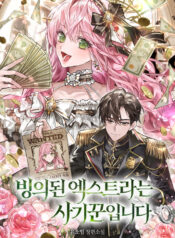Along with the kingdom’s ancient history, the Academy’s graduation ceremony—continuing its legitimacy for 191 years now—had long established itself as one of the kingdom’s major annual events, alongside the Sacred Day, New Year’s celebration, and Thanksgiving.
“My lady, we’re approaching the gate soon.”
As the dizziness and gentle vibrations of the carriage subsided, boisterous voices gradually filled the space around us. Opening the small window to check outside, I saw streets bustling with crowds that had gathered from across the kingdom to witness the graduation ceremony.
Long ago, just once—something I thought I’d never see again—the capital’s pale blue sky laden with clouds stretched endlessly above the cityscape that gleamed copper-red in the sunlight. Beneath that sky, people dressed in similar fashions following the capital’s trends or wearing Academy uniforms hurried along streets paved with colorful bricks arranged in strange patterns.
‘Bri, you were right! How did you know? Questions about human rights and morality had never appeared on the Academy entrance exam before!’
‘Hmm… secret.’
‘Hey, are you serious?’
‘Yes. I am.’
The wind blowing through the sunset-tinted streets felt bitterly cold, heralding the beginning of winter. The southern winters might be barren, but never this sharp. With such thoughts, I had followed Edi, who walked ahead of me on tiptoe, dancing with each step.
‘Tsk. Always keeping secrets.’
After arriving in the capital, she had hastily bought a scarf to cover her reddened nose and turned to look back at me. She puffed her cheeks in protest. At that moment, her light auburn hair, resembling the sunset, fluttered like a painting in the strong wind.
‘Ahhh, my answer sheet!’
‘Give it up. You failed anyway.’
‘Shut up! Why are you deciding that on your own?’
‘I’m not deciding anything. I’m just stating facts.’
‘No, the more I think about it, the more annoyed I get! Hey! Do you think you didn’t fail?’
The Academy, which reportedly allowed commoners to enroll for the first time in 191 years, seemed to contradict that statement by setting difficult problems that deviated from the usual pattern. Every few steps, one could hear the wailing of lanky boys in their growth spurt, their features still soft with youth.
The streets bathed in sunset’s red glow, the wind painfully brushing against my nose, the faint smell of water, and the noisy chatter of boys. And then…
‘Bri.’
Edi, who had fixed her windblown hair and tightened her scarf, stared at me intently.
‘Honestly, the exam wasn’t difficult for you, was it?’
“Have you been to the capital before?”
The voice that had become vivid through my journey back in time was suddenly shattered by the man’s low murmur.
His red eyes looking at me were perfectly round.
His expression was so innocent that I could almost believe he genuinely didn’t know I had once prepared for the Academy exam.
Trying to understand the intention behind his question about whether I’d been to the capital, I eventually gave a small nod.
“Yes. When I was young. Once.”
It was a story from about five years ago, when I was thirteen… barely a trace remained. I belatedly realized it wouldn’t be strange if such information wasn’t included in whatever files he had investigated about me.
“I heard you’ve lived only in the South.”
“What about you?”
Have you been to the capital? At my question, the man blinked his red eyes with a curious expression, seemingly surprised by my inquiry.
“…Yes. A very long time ago.”
Was it nostalgia? Or sorrow? Perhaps lingering attachment to something he could never have again? I couldn’t tell. All I knew about him was that he was the Duke’s aide and… for some reason, he was hiding his identity. That was all.
Deep in thought with his red eyes downcast, black hair, neatly defined nose, and tidy lips beneath. Smooth skin that made his age difficult to guess, and his warm… hand. Taller than Eric, always sitting with legs crossed and arms folded, yet his standing posture was straighter than anyone’s. His voice was low but not fierce, his accent aristocratic yet his speech manner arbitrary.
Like an abstract painting drawn without concern for boundaries. A person impossible to define in a single phrase.
No, someone who shouldn’t be defined.
Suddenly, I came to my senses like waking from a long dream and remembered my position. While my heart hadn’t fluttered at the man’s demeanor, I had certainly grown curious about him. I was a Veritatis who knew propriety. Even if I had entrusted the rest of my life to the northern sky, my roots remained elsewhere.
I took a deep breath. Quickly turning my head away from the man’s strange gaze, I called out to Lord Rumie, who had just dismounted and was looking around.
“Lord. Lord Rumie.”
“Yes…? Ah, yes! My lady.”
Then I asked a needless question.
“Are we heading directly to the checkpoint?”
“Yes! But… how did you know?”
How did I know? Our destination was the center of the capital, so the places we needed to pass through were predetermined. I swallowed hard, my throat completely dry as I spoke whatever came to mind.
“My lady. If you’re feeling unwell…”
“No, I’m fine.”
“Please reconsider. Since passing through the checkpoint will take some time, perhaps you’d like to get off and have a light refreshment?”
“Good idea.”
Just as I was about to refuse again, the man’s voice interrupted. Click, the carriage door opened, letting in a cool breeze… carrying a faint smell of water.
“My lady. Please step down.”
The man, who had already descended from the carriage, extended his hand toward me matter-of-factly. His speech had returned to formal politeness, as if he had never spoken casually.
“Please.”
How strange.
“…If you insist.”
Though my mind recognized nothing unusual about the situation, why did I feel so uncomfortable inside? And yet, why couldn’t I refuse his outstretched hand, instead placing mine on his like someone entranced?
Trying to ignore the warmth felt through the thin gloves, I carefully stepped down from the carriage.
* * *
“This is…”
“Don’t tell me you dislike seafood?”
“Lord. Your manner of speech.”
“…How do you feel about seafood dishes, my lady?”
The people of the capital called the South “a land of abundance under the rule of the merciful sea goddess, where all things are reborn, a paradise of prosperity where rivers and seas flow without rest”—the southern culture was closely tied to the sea. Just as northern culture was inseparable from mythology.
Among these, southern seafood cuisine had long established itself as a regional specialty unlike anything found elsewhere, combining imported exotic spices through trading ports. Famous and widespread, it had become common enough to be enjoyed anywhere in the South.
The man before me surely knew that I, born and raised in the South, a southerner to the bone, couldn’t possibly dislike seafood. I couldn’t understand why he deliberately asked such a question.
“My lady?”
However, seeing the man’s face—clear as a boy’s with that same peculiar playfulness as always—I stopped wondering further. Looking away from his face, I gazed up at the elegant two-story building.
Then I asked: What about you? Do you like seafood?
“Lo—”
I stopped myself mid-word. Hearing my own voice, I realized what I had been about to say. There seemed to be a line between him and me that shouldn’t be crossed. A bright red line that had been invisible until I became conscious of it.
“…My lady? Why,”
I instinctively restrained my neck from turning toward his voice. I cut off his words, somewhat hastily. I pretended to be as calm as possible and gave a very delayed answer.
“I don’t dislike seafood.”
“…That’s fortunate.”
Before any further conversation could take place, I quickly walked past him into the restaurant.
“This way.”
Following the server’s guidance, we were led to a window seat on the second floor overlooking the Oceanos River that flowed around the capital. White curtains constantly fluttered in the breeze coming through the wide-open window.
“We’ll have this.”
The man selected a course meal consisting of a southern-style pasta with shrimp, clams, tomatoes, and a touch of cheese, followed by a main dish of fried white fish covered in a thick sauce seasoned with various spices. It came with two types of wine and a sorbet palate cleanser. He looked up at me as if asking if I had any objections.
Since I had no intention of spending a long time here enjoying an elaborate dinner, I picked up my water glass and moistened my throat in agreement.
“Yes. Then which wine would you prefer…”
“The wine…”
After a long pause, the man chose red wine. Specifically, he pointed directly at the Domero wine, generally considered cheap due to its light body and high acidity. The server asked again, facing a choice no non-southerner would make.
“Are you sure you want this wine?”
With his head still lowered, the man rolled just his eyes to meet my gaze. Following his movement, the server also turned to look at me.
The more I tried not to be curious about him, strangely, the more questions I wanted to ask.
‘What about you?’ ‘Do you like seafood?’ ‘Have you tried it before?’ ‘Isn’t it difficult to find in the North?’ ‘Ah, perhaps when you came to the capital long ago. Did you try it then?’ ‘Did you learn from him?’ ‘The way of pairing seafood with Domero wine…’
Or. Have you ever been to the South?
Swallowing all those questions once more, I smoothly replied:
“…Yes. We’ll take that wine.”
“Then for the other wine…”
“Bring this one.”
After selecting a suitably fresh and crisp white wine that pairs well with shellfish and sending the server away, I looked forward again. I could see the profile of the man who had folded his arms and turned his head to gaze at something beyond the wide-open window. A cool breeze carrying the scent of water blew in. The small noise of clinking tableware and chattering voices, the barely audible rattling of carriages, the cawing of birds.
Everything felt peaceful.
“Brote?”
Until a stranger called my name.






